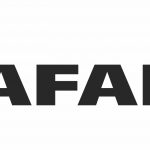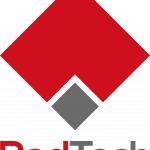Economy
Adrian Grenier Joins Panel Discussion about Green Bitcoin
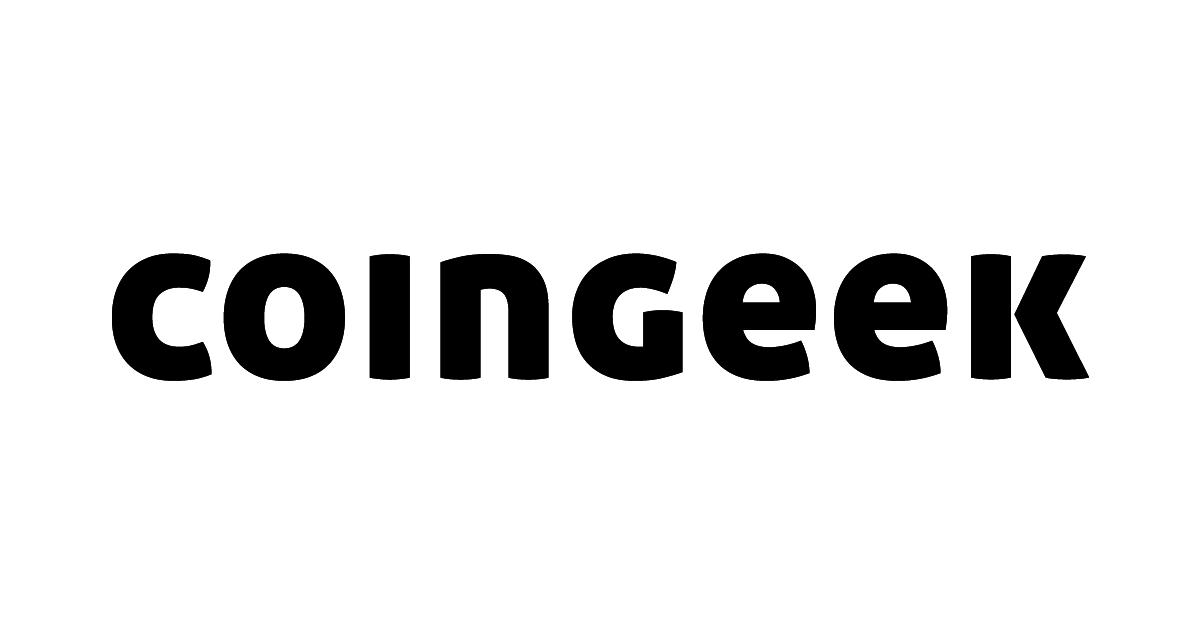
United Nations Environment Goodwill Ambassador and actor Adrian Grenier, who starred in Netflix’s Clickbait, HBO’s Entourage and 20th Century Fox’s The Devil Wears Prada, has joined a panel discussion about Bitcoin energy consumption and sustainability at the recently concluded CoinGeek Conference New York.
Grenier is also known as a strong environmental activist who helped launch UN’s Clean Seas campaign in 2017 and co-founded the Lonely Whale Foundation, which aims to increase awareness and educate people about the status of the globe’s oceans and marine life.
Grenier also has an impact fund called DuContra Ventures, where he is a co-founder and the chief experience officer, that is focused on four categories: the betterment of humans, investing in communities, the future of finance (where his interest in blockchain comes in), and sustainable consumer goods. The actor has also invested in Blueland, which produces plastic-free consumer cleaning products.
The presence of a renowned environmentalist at a Bitcoin event is somewhat of irony as Bitcoin has been touted by the media in the past months as unsustainable and not environmentally friendly with the massive amount of energy Bitcoin mining consumes.
“I think people that want to dismiss crypto as being unsustainable don’t fully understand the complexity of the opportunity that crypto has for society across the board. It’s not just about mining efficiency, it’s also about how it’s going to improve every industry,” Grenier said.
Grenier’s presence means that he has finally found a Green Bitcoin he can support in BSV. The BSV blockchain is the largest public blockchain that can scale unlimitedly to accommodate the data the world is generating.
“If you had a crypto technology that could actually track the exchange of goods and services within the community and keep the value very hyper-local, there’s a lot less loss. I mean, when you put your money in a centralized banking system, you’re losing a lot of money, especially with inflation and the printing of money. And suddenly, they’re stealing your little value. But when you have a hyperlocal currency, you know what’s being shared, and you keep it serving your community,” Grenier explained.
Unlike BTC that has no other utility except as a speculative investment due to its price volatility, small data blocks at only 1MB in size and low throughput at seven transactions per second (tps), a 2GB block has already been mined on the BSV blockchain and the network is preparing to increase its throughput to over 50,000 tps at transaction fees of less than a penny, rivalling the capacity of the VISA network. These numbers are what make BSV the Green Bitcoin and what make BTC simply unsustainable.
“I think it’s really going to transform media. In my business, like filmmaking [and] communications, it’s going to empower artists to have exchange directly with consumers, get commercialization out of that relationship unless chosen. Even just the social media networks. Like what’s happening with Facebook, they’re literally selling our data for profit, and we don’t see any of that money. I like to see social media networks that allow both users and content creators to have a more autonomous exchange of value,” Grenier pointed out.
As BSV continues to scale, millions and even billions of tps can be realized in the future. And with this kind of powerful technology, can usher in a fully on-chain world—improving business systems and processes and maximizing profits—much like how the Internet Protocol has created the online life people are enjoying today. This kind of benefit to mankind is what more than justifies the huge energy consumption of BSV mining.
Economy
Dangote Refinery Denies Importing Petrol, Diesel into Nigeria
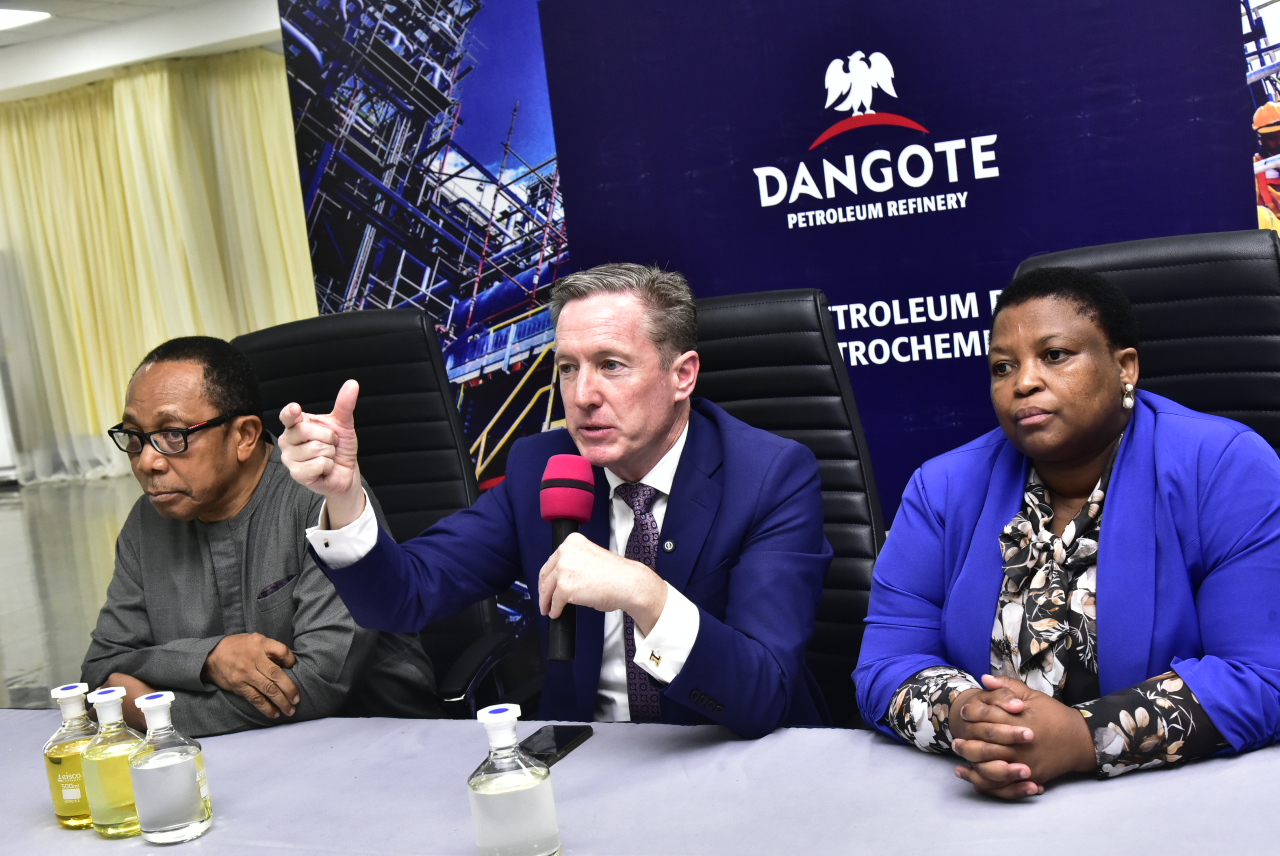
By Modupe Gbadeyanka
Dangote Petroleum Refinery and Petrochemicals has described reports making the rounds that it was importing finished petroleum products like premium motor spirit (PMS), otherwise known as petrol, diesel, and others into Nigeria as false and misleading.
In a chat with newsmen on Wednesday, the company clarified that what it brought into the country were merely intermediate or semi‑processed materials, which it emphasized is a standard practice within the global refining industry.
Intermediate materials—such as naphtha, straight‑run gas oil, vacuum gas oil (VGO), reformate, alkylate and isomerate—serve as feedstock for additional refining into finished fuels like petrol and diesel, as well as petrochemicals.
The chief executive of the facility, Mr David Bird, told journalists in Lagos that as a state‑of‑the‑art and large‑scale merchant refinery, DPRP refines crude oil and processes intermediate feedstocks into premium petroleum products and petrochemicals that meet the highest international standards, noting that this practice does not amount to importing finished petroleum products.
Mr Bird highlighted that Dangote Refinery operates using a European and Asian merchant refinery model, which integrates advanced refining, blending and trading systems designed to meet modern quality and environmental benchmarks.
“DPRP produces high‑quality fuels aligned with international environmental and health standards. Our gasoline is lead‑free and MMT‑free with 50 parts per million sulphur, while our diesel meets ultra‑low sulphur specifications. These standards help reduce emissions, protect engines, and safeguard public health,” the chief executive stated.
Mr Bird reaffirmed that the Dangote Refinery supplies only fully refined, market‑ready products, adding that semi‑finished fuels are unsuitable for vehicles and are therefore not released into the Nigerian market. Samples of both intermediate feedstocks and fully refined products were displayed to journalists during the briefing.
He further noted that the refinery was established to end years of exposure to substandard fuel in Nigeria by providing products that meet stringent global standards, adding that DPRP’s products are now exported to international markets, highlighting their quality and competitiveness.
The refinery chief stressed the company’s commitment to transparency in its operations and engagements with regulators, urging the media to help properly educate the public on the clear distinction between intermediate products and finished fuel.
“It is unfortunate that some individuals are deliberately spreading misleading narratives about a refinery that has transformed Nigeria and the West African region from a dumping ground for substandard fuels into a hub for high‑quality products,” he said, adding that the refinery’s flexible design allows it to process a diverse mix of crude oils and intermediate feedstocks into premium finished fuels.
Mr Bird assured Nigerians of sustained product availability, noting that the refinery has contributed significantly to easing fuel scarcity, stabilising the naira, and reducing pressure on foreign exchange.
On his part, the Chief Brand and Communications Officer of Dangote Industries Limited, Mr Anthony Chiejina, urged journalists to be precise in their choice of terminology, warning that inaccurate reporting could misinform the public and create unnecessary panic.
Economy
Nigeria to Overtake Algeria as Africa’s Third-Largest Economy in 2026—IMF
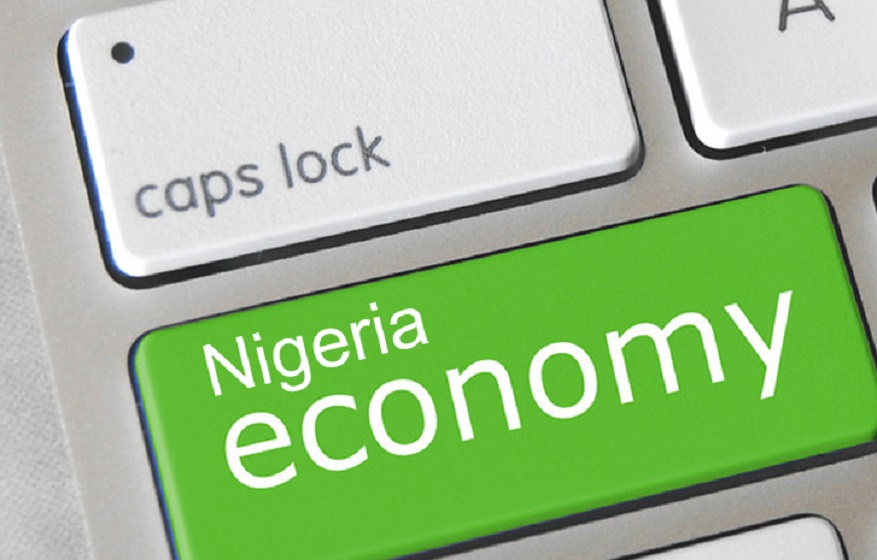
By Adedapo Adesanya
Nigeria is projected to move from being the become the third-largest economy in Africa in 2026 from the fourth position it clinched last year, according to data from the International Monetary Fund (IMF).
In the IMF’s World Economic Outlook (October 2025 edition), accessed via its datamapper, it was indicated that Nigeria’s gross domestic product (GDP) at current prices stood at about $285 billion in 2025, placing it behind South Africa, Egypt and Algeria.
South Africa topped the African ranking with a GDP of about $426 billion, followed by Egypt at $349 billion, and Algeria ranked third with $288 billion.
However, the IMF forecasts that Nigeria will overtake Algeria in 2026 as economic output rebounds, driven by higher oil production, improved foreign exchange liquidity and the impact of ongoing economic reforms.
According to the IMF’s projections, Nigeria’s GDP is expected to rise to $334 billion, putting it ahead of Algeria ($284 billion) and making it Africa’s third-largest economy, behind South Africa ($443 billion) and Egypt ($399 billion).
The lender’s outlook reflects expectations that recent reforms, including petrol subsidy removal, exchange-rate liberalisation and fiscal adjustments, will support medium-term growth, despite short-term inflationary pressures.
Africa’s largest economy’s position has shifted in recent years amid currency devaluations, rebasing exercises and macroeconomic headwinds across major economies on the continent. Nigeria in 2024 lost its status as Africa’s largest economy and dropped to fourth place after a series of Naira devaluations and wider reforms.
However, these appear to have brought about macro reliefs in the near term. On January 19, the IMF reviewed its forecast for Nigeria’s economic growth rate upward to 4.4 per cent in 2026. The Bretton Woods organisation revised the rate upward from its initial projection of 4.2 percent.
Prior to that, on January 13, the World Bank also increased its projection for Nigeria’s economic growth rate for 2026 to 4.4 percent from the 3.7 percent forecast in June 2025.
The federal government expects the Nigerian economy to grow by 4.68 per cent in 2026, supported by easing inflation, improved foreign exchange stability and continued fiscal reforms.
According to the Minister of Finance and Coordinating Minister of the Economy, Mr Wale Edun, the country’s inflation, which peaked above 33 per cent in 2024, declined to 15.15 per cent by December 2025, adding that foreign exchange volatility has eased, with the Naira trading below N1,500 to the Dollar, while external reserves rose to $46 billion.
He added that GDP growth averaged 3.78 per cent by the third quarter of 2025, with 27 sectors recording expansion.
Economy
Lafarge to Expand Sagamu, Ashaka Cement Plants to 5.5MT Per Annum
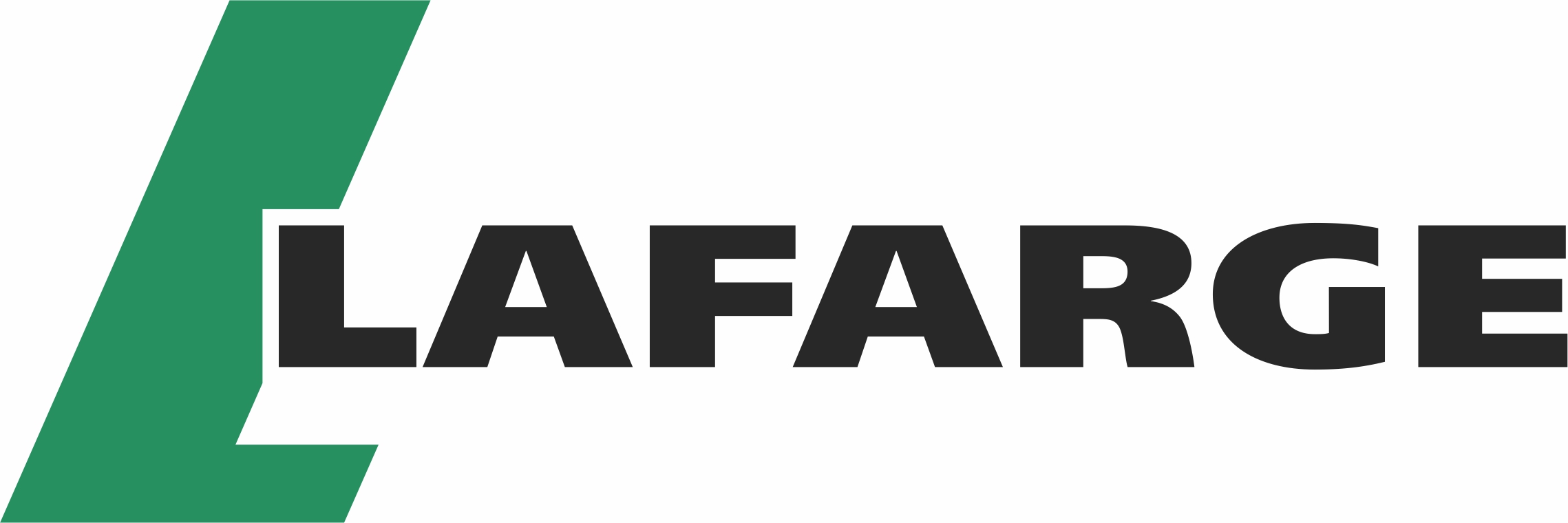
By Aduragbemi Omiyale
One of the leading cement firms, Lafarge Africa Plc, has confirmed plans to expand its plants in Gombe and Ogun States to about 5.5 million metric tonnes per annum.
In a notice to the Nigerian Exchange (NGX) on Wednesday, the company said it was strengthening local cement production with the expansion of its Sagamu Cement Plant in Ogun State and Ashaka Cement Plant in Gombe State.
It noted that the upon completion of the expansion projects, the production capacity of the Ashaka Cement in Gombe State would rise to 2 MT per annum, while the Sagamu facility would increase to 3.5 MT per annum.
The two new plants, the statement disclosed, would be dry plants with preheater kilns, vertical raw mills and roller presses for cement mills to make them energy efficient.
The disclosure signed by the company secretary, Adewunmi Alode, further revealed that the plants are expected to improve product availability and enhance Lafarge Africa’s ability to serve customers efficiently across key markets.
This expansion is coming after the announcement made last year that Huaxin Building Materials Group’s had acquired 83.81 per cent of Lafarge Africa and demonstrates their commitment to Nigeria’s infrastructural development.
The chief executive of Lafarge Africa, Mr Lolu Alade-Akinyemi, stated that the expansion projects reflect the company’s long-term confidence in Nigeria’s growth potential and are aimed at supporting Nigeria’s infrastructure and construction needs.
He explained that the project goes beyond capacity growth to deliver operational and sustainability benefits but also supports value creation for our customers and shareholders while contributing to economic activity and job creation across our host communities and the wider construction ecosystem.
“The expansion of our plants is a strategic investment that reinforces Lafarge Africa’s role in supporting national development. By increasing capacity at our flagship plants, we are strengthening our supply chain, improving our responsiveness to market demand, and positioning the business to better support critical sectors such as housing, commercial construction, and infrastructure.
“It enables us to integrate modern production technologies that enhance efficiency, reliability, and environmental performance, in line with our commitment to responsible operations,” Mr Alade-Akinyemi, stated.
-

 Feature/OPED6 years ago
Feature/OPED6 years agoDavos was Different this year
-
Travel/Tourism9 years ago
Lagos Seals Western Lodge Hotel In Ikorodu
-

 Showbiz3 years ago
Showbiz3 years agoEstranged Lover Releases Videos of Empress Njamah Bathing
-

 Banking8 years ago
Banking8 years agoSort Codes of GTBank Branches in Nigeria
-

 Economy3 years ago
Economy3 years agoSubsidy Removal: CNG at N130 Per Litre Cheaper Than Petrol—IPMAN
-

 Banking3 years ago
Banking3 years agoSort Codes of UBA Branches in Nigeria
-

 Banking3 years ago
Banking3 years agoFirst Bank Announces Planned Downtime
-

 Sports3 years ago
Sports3 years agoHighest Paid Nigerian Footballer – How Much Do Nigerian Footballers Earn







